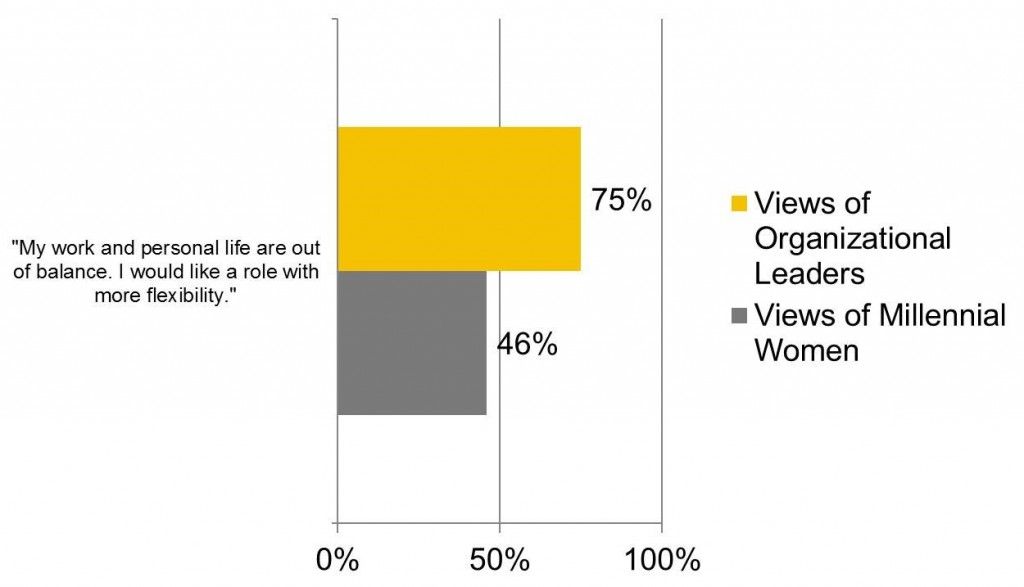
By Christie Hunter Arscott and Lauren Noël
While conventional wisdom supports the notion that men leave jobs for higher paying roles and women leave to focus on families, our recent ICEDR global study of millennials tells a different story.
Contrary to popular perception, women around the age of thirty identified finding a higher paying job as the primary reason why they would leave their current employer.
Our findings should not come as a surprise. A 2014 study featured in Harvard Business Review found that only one in ten women leave the workplace to have children, while McKinsey reports that the majority of women are not opting out of the workforce because they cannot afford to. Rather, they are leaving specific jobs for others. The bottom line is: women care about pay. As one millennial woman we spoke with said:
“Pay is substantially important to keep me here. Many of my peers have left the company because the level of what they do does not match their compensation.”
Despite the alignment in findings across studies, our research reveals that organizational leaders still believe that the majority of women around the age of 30 leave because they are struggling to balance work and life or planning to have children. As a result of these misperceptions, there is a disconnect between current talent retention strategies and the desires of top female talent.

Based on our research, there are two easy steps organizational leaders can take to improve their retention of millennial women:
With many studies approximating that women make 75 cents for every dollar that a man makes, it is no surprise then that early career women prioritize pay and compensation fairness when it comes to choosing their employer. By compiling and analyzing compensation data by gender, company leaders can get a better picture of whether or not employees are receiving fair and equitable compensation based on role, responsibilities, level, and performance. If gender gaps exist, executives have the opportunity to reconcile these gaps through data-driven people strategies and, more importantly, paying women the same as their male peers. As Ann Friedman states in her NY Magazine Article One Weird Trick For Keeping Female Employees From Quitting, “Paying women more, from their first job onward, is a game-changer”.
Are you struggling to retain and advance early career women? Steer clear of developing retention strategies in board rooms full of executives and HR leaders (far removed from the day-to-day existence and input of the women you are trying to retain). Instead, seek to understand the needs, desires and priorities of your people. It can be as simple as quick survey or focus group asking women what is important to them at work, why they would stay with your organization, and what would make them leave. Alternatively, you could form a Millennial Advisory Board to represent the voices and needs of millennials and help shape people strategies. Regardless of how you do it, the key is to give millennial women a voice by asking, not assuming. Instead of talking about them, talk with them.
Talent strategies based on gender stereotypes and assumptions are doomed to fail. Want to retain your millennial women? It is simple: Pay them more and talk with them, not just about them.
Christie Hunter Arscott is a leading millennial expert on gender and generational strategies. She is a Rhodes Scholar, World Economic Forum Global Shaper, and Principal of ICEDR’s NextGen Women’s Leadership Institute. She’s on Twitter at @CHunterArscott.
Lauren Noël works for the International Consortium for Executive Development Research (ICEDR), a global think tank of 38 companies and 23 business schools focused on leadership. She is the Managing Director of ICEDR’s NextGen Women’s Leadership Institute.

Thinkers50 Limited
The Studio
Highfield Lane
Wargrave RG10 8PZ
United Kingdom

Thinkers50 Limited
The Studio
Highfield Lane
Wargrave RG10 8PZ
United Kingdom

Thinkers50 Limited
The Studio
Highfield Lane
Wargrave RG10 8PZ
United Kingdom
| Cookie | Duration | Description |
|---|---|---|
| LANG | 9 hours | Linkedin set this cookie to set user's preferred language. |
| nsid | session | This cookie is set by the provider PayPal to enable the PayPal payment service in the website. |
| sp_landing | 1 day | The sp_landing is set by Spotify to implement audio content from Spotify on the website and also registers information on user interaction related to the audio content. |
| sp_t | 1 year | The sp_t cookie is set by Spotify to implement audio content from Spotify on the website and also registers information on user interaction related to the audio content. |
| tsrce | 3 days | PayPal sets this cookie to enable the PayPal payment service in the website. |
| x-pp-s | session | PayPal sets this cookie to process payments on the site. |
| __cf_bm | 30 minutes | This cookie, set by Cloudflare, is used to support Cloudflare Bot Management. |
| Cookie | Duration | Description |
|---|---|---|
| l7_az | 30 minutes | This cookie is necessary for the PayPal login-function on the website. |
| Cookie | Duration | Description |
|---|---|---|
| CONSENT | 2 years | YouTube sets this cookie via embedded youtube-videos and registers anonymous statistical data. |
| _ga | 2 years | The _ga cookie, installed by Google Analytics, calculates visitor, session and campaign data and also keeps track of site usage for the site's analytics report. The cookie stores information anonymously and assigns a randomly generated number to recognize unique visitors. |
| _gat_gtag_UA_10408481_1 | 1 minute | Set by Google to distinguish users. |
| _ga_ZP8HQ8RZXS | 2 years | This cookie is installed by Google Analytics. |
| _gid | 1 day | Installed by Google Analytics, _gid cookie stores information on how visitors use a website, while also creating an analytics report of the website's performance. Some of the data that are collected include the number of visitors, their source, and the pages they visit anonymously. |
| Cookie | Duration | Description |
|---|---|---|
| NID | 6 months | NID cookie, set by Google, is used for advertising purposes; to limit the number of times the user sees an ad, to mute unwanted ads, and to measure the effectiveness of ads. |
| test_cookie | 15 minutes | The test_cookie is set by doubleclick.net and is used to determine if the user's browser supports cookies. |
| VISITOR_INFO1_LIVE | 5 months 27 days | A cookie set by YouTube to measure bandwidth that determines whether the user gets the new or old player interface. |
| YSC | session | YSC cookie is set by Youtube and is used to track the views of embedded videos on Youtube pages. |
| yt-remote-connected-devices | never | YouTube sets this cookie to store the video preferences of the user using embedded YouTube video. |
| yt-remote-device-id | never | YouTube sets this cookie to store the video preferences of the user using embedded YouTube video. |
| yt.innertube::nextId | never | This cookie, set by YouTube, registers a unique ID to store data on what videos from YouTube the user has seen. |
| yt.innertube::requests | never | This cookie, set by YouTube, registers a unique ID to store data on what videos from YouTube the user has seen. |
| Cookie | Duration | Description |
|---|---|---|
| DEVICE_INFO | 5 months 27 days | No description |
| loglevel | never | No description available. |
| m | 2 years | No description available. |
Thinkers50 Limited has updated its Privacy Policy on 28 March 2024 with several amendments and additions to the previous version, to fully incorporate to the text information required by current applicable date protection regulation. Processing of the personal data of Thinkers50’s customers, potential customers and other stakeholders has not been changed essentially, but the texts have been clarified and amended to give more detailed information of the processing activities.